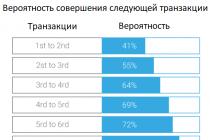Who was the first subscriber - a child or an adult? What was bothering him at that moment? We won't tell you this: confidentiality was initially the main condition for the operation of the emergency psychological assistance service, created on the initiative of the Foundation for Support of Children in Difficult Life Situations. One thing is for sure: at the other end of the line, the caller heard in response the voice of a person who was really ready to listen and help.
principles of operation of a single federal helpline number for children, adolescents and their parents
dial the number
the region from which they are calling is determined
the call is forwarded to the service in your region
if the line is busy, the call is forwarded to a second service in this region, etc., until the psychologist answers
The helpline service is staffed by specially trained psychologists-consultants.
Their main task is to relieve the severity of psycho-emotional stress, the experiences that the caller is experiencing at the moment, and to protect the young or adult interlocutor from reckless and dangerous actions.
The task is as follows:
analyze the situation together with the subscriber
identify its causes
suggest algorithms for getting out of the current situation
and motivate a person to try to solve the problem himself
Communication with a psychologist is absolutely anonymous: no one will ask for an invoice for the conversation, no matter how long it turns out, to give your name, surname, address:
Calls from any mobile or landline phone are free.
Currently connected to a single number 8-800-2000-122
Works so that children, their parents and just people who are not indifferent to the misfortune of a child living nearby can receive timely help from a professional psychologist
after all, this is why a single All-Russian children's helpline was created.
About transferring the children's helpline to a short three-digit number
Currently, the children's helpline is recognized as a key tool for realizing the child's rights to information and protection from all forms of violence and abuse. Since the launch of the children's helpline, more than 8 million calls have been received to its number.
Due to the high social significance and relevance of the tasks solved by the children's helpline services, the Foundation considers the transfer of the number 8-800-2000-122 to a three-digit number to be among the Foundation's priority tasks. To solve this problem, since 2014 the Foundation has been conducting consolidated work with the Ministry of Telecom and Mass Communications of Russia.
Currently, the limiting factor in replacing the number with a three-digit number is the technical imperfection of equipment on local telephone networks that ensures the processing of short three-digit numbers. The Ministry of Telecom and Mass Communications of Russia is making efforts to create and operate a system for providing short number calls. To date, the necessary system has been put into operation in 8 regions, and tests have been successfully completed in 3 more regions.
Information about the operation of the children's helpline
In September 2010, the Fund for Support of Children in Difficult Life Situations (hereinafter referred to as the Fund), together with the constituent entities of the Russian Federation, introduced a single all-Russian children's helpline number - 8-800-2000-122 . Currently, more than 220 organizations in 85 constituent entities of the Russian Federation are connected to it.
When calling this number in any locality of the Russian Federation from landline or mobile phones, children, adolescents and their parents, and other citizens can receive emergency psychological assistance, which is provided by specialists from existing regional services connected to a single all-Russian number. Anonymity, confidentiality and accessibility are the basic principles of the children's helpline. This means that you can receive psychological help without giving your name, free of charge, and the confidentiality of your request is guaranteed. The purpose of such assistance is to help prevent family dysfunction, stress and suicidal feelings in children and adolescents, protect children's rights and strengthen families.
Ensuring the activities of the children's helpline is carried out within the framework signed between the Fund and the constituent entities of the Russian Federation agreements on ensuring the operation of a children's helpline (emergency psychological assistance services) with a single all-Russian telephone number.
In order to develop children's helpline services and improve the quality of telephone counseling, the Foundation annually organizes training for specialists from regional children's helpline services.
Results of the work of the DTD for the period 2008 - 2018. summarized in the information collection “Development of the activities of the children's helpline” (Moscow 2018). The materials in the collection are posted on the Foundation’s website in the “Library” section.
About transferring the children's helpline to a short three-digit number
Currently, the children's helpline is recognized as a key tool for realizing the child's rights to information and protection from all forms of violence and abuse. Since the launch of the children's helpline, its number has received about 9 million calls. Due to the high social significance and relevance of the tasks solved by the children's helpline services, the Foundation considers the transfer of the number 8-800-2000-122 to a three-digit number to be a priority task.
To solve this problem, since 2014 the Foundation has been conducting consolidated work with the Ministry of Telecom and Mass Communications of Russia. Currently, the limiting factor in replacing the number with a three-digit number is the technical imperfection of equipment on local telephone networks that ensures the processing of short three-digit numbers. The Ministry of Telecom and Mass Communications of Russia is making efforts to create and operate a system for providing short number calls.
Functioning departments and offices :
· 2 pediatric departments
· prevention department provides medical care in organized groups (schools, kindergartens), includes a teenage room, a room for a healthy child.
· Trauma department provides primary outpatient care.
· Department of Physiotherapy- intended for follow-up treatment and rehabilitation of children on an outpatient basis using modern methods of treatment, physiotherapy, reflexology, physical therapy, massage, exercises in gyms and other specialized rooms; electrolight therapy, UHF therapy, heat therapy /paraffin, ozokerite/, magnetic therapy, laser therapy, electrosleep, hydrotherapy. The department is well equipped and has a set of modern equipment. Magnetic therapy is widely used for the treatment of trauma patients (dislocations, sprains, fractures, bruises, hematomas, etc.). Laser therapy is used in the treatment of a wide variety of diseases of otolaryngology, ophthalmology, upper and lower respiratory tract and many others.
· Department of Radiation Diagnostics. Equipped with a new digital x-ray machine.
· Clinical diagnostic laboratory. Conducts research: general clinical blood test, general urine test, blood test for sugar, urine, feces - physical and chemical properties, hemosyndrome, study of genitourinary discharge, urine test according to Nechiporenko, Zimnitsky.
· The consultation and diagnostic department includes rooms: infectious, immunological, gynecological, cardiological, rheumatological, ophthalmologist, otolaryngologist, neurological, cardiologist, allergological, gastroenterological, orthopedic, surgical, nephrological, endocrinological, urological.
· Vision protection office equipped with the most modern medical equipment, including the computer program "ECE" and "ZEBRA" and bioresonant color therapy "ASSO", treatment of strabismus and correction of refractive pathology is carried out.
· In the offices Ultrasound Research of all organs and systems is carried out.
· In functional diagnostic rooms– ECG, EEG, Holter monitoring, 24-hour blood pressure monitoring are performed
· Day hospital. For patients who do not require round-the-clock medical supervision, but who require daily short-term medical supervision and therapeutic and diagnostic procedures, a complex of preventive, diagnostic, therapeutic and rehabilitation measures is carried out.
· Health Center. The structure of the center includes offices of pediatricians, medical prevention, healthy lifestyle schools, a testing room on a hardware and software complex, instrumental and laboratory examination rooms, a physical therapy room;
INFORMATION SHEETon the organization and procedure for providing high-tech medical care to residents of Moscow
High-tech medical care (hereinafter - HTMC) is part of specialized medical care and includes the use of new complex and (or) unique treatment methods, as well as resource-intensive treatment methods with scientifically proven effectiveness, including cellular technologies, robotic technology, information technology and genetic engineering methods developed on the basis of the achievements of medical science and related branches of science and technology.
The organization and procedure for providing high-tech medical care to residents of Moscow are determined by order of the Ministry of Health and Social Development of the Russian Federation dated December 28, 2011 No. 1689n “On approval of the procedure for sending citizens of the Russian Federation to provide high-tech medical care at the expense of budgetary allocations provided for in the federal budget to the Ministry of Health and Social Development of the Russian Federation , using a specialized information system.”
The list of profiles and types of high-tech medical care is determined by the order of the Ministry of Health and Social Development of the Russian Federation dated December 29, 2012 No. 1629n “On approval of the list of types of high-tech medical care” (until December 31, 2013). On January 1, 2014, Order No. 565n of the Ministry of Health of the Russian Federation dated August 12, 2013 “On approval of the list of types of high-tech medical care” comes into force.
Residents of Moscow can receive VMP from medical organizations of the state healthcare system of the city of Moscow, as well as from federal medical organizations subordinate to the Ministry of Health of the Russian Federation, the Russian Academy of Medical Sciences and the Federal Medical and Biological Agency.
Currently, 36 city hospitals provide more than 80 types of high-tech medical care in all 20 profiles of high-tech medical care, established by Order of the Ministry of Health of Russia dated December 29, 2012 No. 1629n “On approval of the list of types of high-tech medical care.” In accordance with this order, more than 58,000 high-tech therapeutic and diagnostic interventions are performed annually in medical organizations of the Moscow state healthcare system.
Thus, annually in city hospitals more than 5,560 high-tech microsurgical, combined and reconstructive plastic surgeries are performed on the organs of the thoracic and abdominal cavities, about 10,500 coronary angiographies, 5,000 stenting of coronary vessels and 6,800 balloon angioplasties, 290 operations to correct congenital and acquired heart defects, surgical treatment of cardiac arrhythmias by implantation of pacemakers (more than 2,750 operations). In a number of city hospitals, which include traumatology and orthopedic departments, more than 3.5 thousand operations on endoprosthetics of large joints are performed.
In 2012, medical organizations of the Moscow public health system performed 142 kidney transplants, 35 liver transplants, 11 donor heart transplants, 5 lung transplants, 9 pancreas and duodenal transplants.
List of medical organizations of the Moscow state healthcare system that provide high-tech medical care:
| №№ | Profile of high-tech medical care | Name of medical organizations of the state healthcare system of the city of Moscow |
Abdominal surgery | State Budgetary Healthcare Institution of Moscow "Research Institute for Emergency Medicine named after N.V. Sklifosovsky DZM", State Budgetary Healthcare Institution of Moscow "Moscow Clinical Scientific and Practical Center of the Department of Health Care" *, State Budgetary Healthcare Institution of Moscow "State Clinical Hospital named after SP. Botkin DZM", State Budgetary Healthcare Institution of Moscow "City Clinical Hospital No. 1 named after N.I. Pirogov DZM"*, GBUZ of the city of Moscow "City Clinical Hospital No. 7 DZM", GBUZ of the city of Moscow "City Clinical Hospital No. 12 DZM", GBUZ of the city of Moscow "City Clinical Hospital No. 24 DZM", GBUZ of the city of Moscow "City Clinical Hospital No. 31 DZM"*, GBUZ of the city of Moscow " City Clinical Hospital No. 50 DZM"*, GBUZ of the city of Moscow "GKB No. 6*4 DZM", GBUZ of the city of Moscow "GKB No. 67 DZM", GBUZ of the city of Moscow "GKB No. 79 DZM", GBUZ of the city of Moscow "GVV No. 3 DZM", GBUZ of the city of Moscow "DGKB No. 13 named after N.F. Filatova DZM" | |
obstetrics and gynecology | GBUK of the city of Moscow "Center for Family Planning and Reproduction of the Department of Health", GBUZ of the city of Moscow "GKB named after S.P. Botkin DZM", State Budgetary Healthcare Institution of Moscow "City Clinical Hospital No. 1 named after N.I. Pirogov DZM"*, GBUZ of the city of Moscow "City Clinical Hospital No. 12 DZM", GBUZ of the city of Moscow "City Clinical Hospital No. 31 DZM"*, GBUZ of the city of Moscow "City Clinical Hospital No. 50 DZM"*, GBUZ of the city of Moscow "City Clinical Hospital No. 64 DZM", GBUZ of the city of Moscow "GKB No. 79 DZM", State Budgetary Healthcare Institution of Moscow. "Maternity hospital No. 17 DZM" | |
Gastroenterology | GBUZ of the city of Moscow "Moscow Clinical Scientific and Practical Center of the Department of Health of the Health", GBUZ of the city of Moscow "GKB named after SP. Botkin DZM", State Budgetary Healthcare Institution of Moscow "GKB No. 24" | |
Hematology | GBUZ of the city of Moscow "GKB named after SP. Botkin DZM", State Budgetary Healthcare Institution of the City of Moscow "City Clinical Hospital No. 40 of the Department of Health Care", State Budgetary Healthcare Institution of the City of Moscow "City Clinical Hospital No. 52 of the Department of Health Care" | |
Dermatovenereology | State Budgetary Healthcare Institution of Moscow "Scientific and Practical Center of Dermatovenereology and Cosmetology DZM" | |
Combustiology | State Budgetary Healthcare Institution of Moscow "Research Institute for Emergency Medicine named after N.V. Sklifosovsky DZM", State Budgetary Healthcare Institution of Moscow "GKB. No. 36 DZM", State Budgetary Healthcare Institution of Moscow "Children's Clinical Hospital No. 9 named after G.N. Speransky DZM" | |
Neurosurgery | State Budgetary Healthcare Institution of Moscow "Research Institute for Emergency Medicine named after N.V. Sklifosovsky DZM", State Budgetary Healthcare Institution of Moscow "State Clinical Hospital named after SP. Botkin DZM", State Budgetary Healthcare Institution of Moscow "City Clinical Hospital No. 15 named after O.M. Filatova DZM", State Budgetary Healthcare Institution of Moscow "City Clinical Hospital No. 67 of the Department of Health Care", State Budgetary Healthcare Institution of the City of Moscow "Research Institute of Emergency Pediatric Surgery and Traumatology of the Department of Health Care", State Budgetary Healthcare Institution of the City of Moscow "Scientific and Practical Center for Medical Care for Children with Developmental Defects of the Craniofacial Region and Congenital Diseases of the Nervous System of the Department of Health Care", GBUZ of the city of Moscow "Morozovskaya Children's City Clinical Hospital of the Department of Health", GBUZ of the city of Moscow "Children's City Clinical Hospital No. 9 named after G.N. Speransky DZM" | |
Neonatology | GBUZ of the city of Moscow "Center for Family Planning and Reproduction of the Department of Health", GBUZ of the city of Moscow "City Clinical Hospital No. 13 of the Department of Health", GBUZ of the city of Moscow "City Clinical Hospital No. 8 of the Department of Health", GBUZ of the city of Moscow "Children's Clinical Hospital No. 13 named after N.F. Filatova DZM", Moscow State Budgetary Healthcare Institution "DIKB No. 6 DZM" | |
Oncology | GBUZ of the city of Moscow "Moscow City Oncology Hospital No. 62 DZM", GBUZ of the city of Moscow "Oncological Clinical Dispensary No. 1 DZM", GBUZ of the city of Moscow "City Clinical Hospital No. 24 DZM", GBUZ of the city of Moscow "City Clinical Hospital No. 40 DZM", GBUZ of the city of Moscow "GKB No. 57 DZM", Moscow State Budgetary Healthcare Institution "Morozovskaya Children's City Clinical Hospital DZM" | |
Otorhinolaryngology | GBUZ of the city of Moscow "MNPC of otorhinolaryngology DZM", GBUZ of the city of Moscow "GKB No. 1 named after N.I. Pirogov DZM”, State Budgetary Healthcare Institution of the City of Moscow “City Clinical Hospital No. 67 of the Department of Health Care Administration”, State Budgetary Healthcare Institution of the City of Moscow “Morozovskaya Children’s State Clinical Hospital of the Department of Health Care”, State Budgetary Healthcare Institution of the City of Moscow “St. Speransky DZM" | |
Ophthalmology | GBUZ of the city of Moscow "OKB DZM", GBUZ of the city of Moscow "GKB No. 1 named after N.Y. Pirogov DZM", State Budgetary Healthcare Institution of the City of Moscow "City Clinical Hospital No. 12 of the Department of Health of the City of Moscow", State Budgetary Healthcare Institution of the City of Moscow "City Clinical Hospital No. 15 named after O.M. Filatov DZM", State Budgetary Institution of Moscow "City Clinical Hospital No. 36 Department of Health Care", State Budgetary Healthcare Institution of the City of Moscow "City Clinical Hospital No. 67 Department of Health Care" | |
Pediatrics | GBUZ of the city of Moscow "Morozovskaya Children's City Clinical Hospital of the Moscow City Health Department". GBUZ of the city of Moscow "St. Vladimir Children's City Clinical Hospital No. 9 named after G.N. Speransky Department of Health Care", State Budgetary Healthcare Institution of Moscow "DIKB No. 6 Department of Health Care" | |
Rheumatology | State Budgetary Healthcare Institution of Moscow “City Clinical Hospital No. 1 named after N.I. Pirogov DZM", Moscow City Clinical Hospital No. 4. DZM", Moscow State Budgetary Healthcare Institution "City Clinical Hospital No. 52 DZM" | |
Cardiovascular surgery | State Budgetary Healthcare Institution of Moscow "Research Institute for Emergency Medicine named after N.V. Sklifosovsky Department of Health Care", State Budgetary Healthcare Institution of Moscow "Scientific and Practical Center for Interventional Cardioangiology of the Department of Healthcare of the City of Moscow", State Budgetary Healthcare Institution of Moscow "State Clinical Hospital named after SP. Botkin DZM", State Budgetary Healthcare Institution of Moscow "City Clinical Hospital No. 1 named after N.I. Pirogov DZM"*, GBUZ of the city of Moscow "City Clinical Hospital No. 4 DZM", GBUZ of the city of Moscow "City Clinical Hospital No. 7 DZM", GBUZ of the city of Moscow "City Clinical Hospital No. 12 DZM", GBUZ of the city of Moscow "City Clinical Hospital No. 15 named after O.M. Filatov DZM", GBUZ of the city of Moscow "City Clinical Hospital No. 23 DZM", GBUZ of the city of Moscow "City Clinical Hospital No. 64 DZM", GBUZ of the city of Moscow City Clinical Hospital No. 81 DZM", GBUZ of the city of Moscow "DGKB No. 13 named after N.F. Filatova DZM" | |
Thoracic surgery | State Budgetary Healthcare Institution of Moscow "Research Institute for Emergency Medicine named after N.V. Sklifosovsky DZM", State Budgetary Healthcare Institution of Moscow "City Clinical Hospital No. 36. Department of Health Care", State Budgetary Healthcare Institution of Moscow "DGKK No. 13 named after N.F. Filatova DZM" | |
Traumatology and orthopedics (including endoprosthetics of large joints) | State Budgetary Healthcare Institution of Moscow "Research Institute for Emergency Medicine named after N.V. Sklifosovsky DZM", State Budgetary Institution of Moscow "MNPC of Medical Rehabilitation, Rehabilitation and Sports Medicine of the Department of Health", State Budgetary Institution of the City of Moscow "Research Institute of Emergency Pediatric Surgery and Traumatology of the Department of Health", State Budgetary Institution of the City of Moscow "State Clinical Hospital named after SP. Botkin DZM", State Budgetary Healthcare Institution of Moscow "City Clinical Hospital No. 1 named after N.I. Pirogov DZM", GBUZ of the city of Moscow "City Clinical Hospital No. 7 DZM", GBUZ of the city of Moscow "City Clinical Hospital No. 12 DZM", GBUZ of the city of Moscow "City Clinical Hospital No. 13 DZM", GBUZ of the city of Moscow "City Clinical Hospital No. 15 named after O.M. Filatova DZM", GBUZ of the city of Moscow "City Clinical Hospital No. 31 DZM", GBUZ of the city of Moscow "City Clinical Hospital No. 59 DZM", GBUZ of the city of Moscow "City Clinical Hospital No. 64 DZM", GBUZ of the city of Moscow "City Clinical Hospital No. 67 DZM", GBUZ of the city of Moscow "GKB No. 81 DZM", GBUZ of the city of Moscow "GVV No. 2 DZM", GBUZ of the city of Moscow "GVV No. 3 DZM", GBUZ of the city of Moscow "Morozovskaya Children's City Clinical Hospital DZM", GBUZ of the city of Moscow "DGKB No. 13 named after N.F. Filatova DZM" | |
Transplantation | State Budgetary Healthcare Institution of Moscow "Research Institute for Emergency Medicine named after N.V. Sklifosovsky DZM", Moscow City Clinical Hospital No. 7 DZM" | |
Urology | State Budgetary Healthcare Institution of Moscow “City Clinical Hospital No. 1 named after N.I. Pirogov DZM"*, GBUZ of the city of Moscow "City Clinical Hospital No. 12 DZM", GBUZ of the city of Moscow "City Clinical Hospital No. 31 DZM"*, GBUZ of the city of Moscow "City Clinical Hospital No. 50 DZM"*, GBUZ of the city of Moscow "City Clinical Hospital No. 57 DZM", GBUZ of the city of Moscow "Morozov Children's City Clinical Hospital No. 13 named after N.F." Filatova DZM" | |
Maxillofacial Surgery | GBUZ of the city of Moscow "Moscow Clinical Scientific and Practical Center of the Department of Health" *, GBUZ of the city of Moscow "City Clinical Hospital No. 1 named after N.I. Pirogov DZM", Moscow State Budgetary Healthcare Institution "GKB No. 36 DZM" | |
Endocrinology | GBUZ of the city of Moscow "GKB No. 67 DZM", GBUZ of the city of Moscow "GKB No. 81 DZM", GBUZ of the city of Moscow "GVV No. 3 DZM", GBUZ of the city of Moscow "Morozovskaya GKB DZM |
At the same time, in accordance with the Agreement between the Moscow Government and the Ministry of Health of the Russian Federation on the provision of a subsidy from the federal budget to the budget of the city of Moscow to co-finance the state task for the provision of high-tech medical care, 25 city hospitals are taking part in the implementation of this program, in which more than 7 receive high-tech medical care annually 300 residents of Moscow.
In addition, high-tech medical care is provided to residents of Moscow in federal medical organizations. Every year, more than 35.5 thousand Muscovites receive this type of medical care in federal clinics.
To obtain high medical care in medical organizations of the state healthcare system of the city of Moscow or in federal medical organizations, in accordance with Order of the Ministry of Health and Social Development of Russia No. 1689n dated December 28, 2011 “On approval of the procedure for sending citizens of the Russian Federation to provide high-tech medical care at the expense of budgetary allocations provided for in the federal budget to the Ministry of Health and Social Development of the Russian Federation, using a specialized information system,” which can be found on the website of the Ministry of Health of Russia at:
http://www.rosminzdrav.ru/docs/mzsr/high-tech-med/...,
To issue a “Voucher for the provision of medical treatment”, the patient (or his legal representative) must submit the following documents:
· written application from the patient (his legal representative, authorized representative), consent to the processing of personal data of the citizen (patient);
· an extract from the protocol of the decision of the medical commission of the medical institution at the place of observation and treatment with a recommendation on the need to provide VMP (original);
· an extract from the medical documentation signed by the head of the medical organization at the place of treatment and observation of the patient, containing
· information about the diagnosis of the disease, information about the state of health, examination and treatment performed; -results of laboratory, instrumental and other types of medical
· research on the profile of the disease;
· a copy of the passport of a citizen of the Russian Federation (pages 2, 3 and 5);
· a copy of the compulsory health insurance policy;
· a copy of the certificate of compulsory pension insurance (if available);
· a copy of the disability document (if available).
These documents should be submitted to the Department's Reception Office.
Health Department of the city of Moscow at the address: Moscow, 2nd Shchemilovsky lane, 4A daily, except weekends and holidays, from 9 a.m. until 13 o'clock 30 min. and from 2 p.m. 30 min. until 18:00, telephone for inquiries: 8-499-973-08-61.
Infectious diseases have plagued man throughout history. Our body can acquire resistance to infectious diseases (immunity) in two ways. The first is to get sick and recover. The second way is vaccination. In this case, weakened microorganisms or their individual components are introduced into the body, which stimulate an immune protective response.
Immunoprophylaxis of infectious diseases is a system of measures carried out to prevent, limit the spread and eliminate infectious diseases through preventive vaccinations.
Preventive vaccinations (vaccination) are aimed at combating infectious diseases and are based on the use of vaccines and toxoids to protect populations susceptible to infections.
Often parents are faced with a choice whether to vaccinate their child or not.
Having once seen a child with whooping cough or diphtheria, the question of the need for vaccination would not even arise among the parents, since these diseases are considered very serious, and the clinical picture is horrifying and suffering. Many diseases, especially diphtheria, have a very high mortality rate. It should be absolutely clear that the group of diseases against which vaccination is carried out is dangerous, because there is a real risk of infection.
It is the duty of every medical worker to warn about unjustified risks.
As a result, vaccination is a thoughtful step; refusal to vaccinate is an unjustified risk.
You cannot protect yourself and your loved ones from all dangers, but you can avoid dangerous infectious diseases.
Vaccination is necessary for everyone, regardless of age. Most people are now unaware that many vaccinations, once given in childhood, must be repeated throughout life.
Currently, in accordance with the regional calendar of preventive vaccinations (order of the Moscow Department of Health dated July 4, 2014 No. 614), you can be vaccinated against the following infections: viral hepatitis B, tuberculosis, pneumococcal infection, diphtheria, tetanus, polio, whooping cough, measles, mumps, rubella, Haemophilus influenzae, influenza, hepatitis A, chickenpox, human papillomavirus.
In Moscow, vaccinations are carried out in clinics, in medical offices of preschool institutions, schools, and colleges. Vaccination rooms are available in all children's and adult clinics. You can get yourself and your children vaccinated for free at the public clinic at your place of residence.
To do this, you need to make an appointment with a doctor, which will not be difficult. You can make an appointment in the following ways.
1. By phone:
1.1. Sign up through the Clinic Registration Office.
1.2. Make an appointment through the Contact Center +7 495 539 3000.
2. Via the Internet:
2.1. Registration through the websites www.pgu.mos.ru, www.gosuslugi.ru.
2.2. Registration via emias.info
2.3. Recording through the EMIAS mobile application (available for iOS and Android).
3. Personal visit to the clinic.
3.1. Sign up through the Information Kiosk in the clinic lobby.
Take care of your health in advance, get preventive vaccinations!
To receive a referral for a preventive examination, you must contact your local pediatrician at the clinic!!!
Medical examination is carried out according to the schedule:
DGP No. 86 AC Friday 8.30 – 12.30
Branch No. 1 Wednesday 8.30 – 12.30
Branch No. 2 Friday 8.30 -12.30
Information about the timing, procedure, and results of the medical examination of minors.
In the State Budgetary Healthcare Institution “DGP No. 86 DZM”, medical examination of minors is carried out in accordance with the order of the Ministry of Health of Russia dated August 10, 2017. No. 514n “On the procedure for preventive medical examinations of minors.”
A medical examination is a complex of medical interventions aimed at identifying pathological conditions, diseases and risk factors for their development.
Preventive medical examinations of minors (hereinafter referred to as preventive examinations) are carried out at established age periods for the purpose of early (timely) identification of pathological conditions, diseases and risk factors for their development, as well as for the purpose of forming health status groups and developing recommendations for minors.
Medical examinations of minors are carried out within the framework of the program of state guarantees of free provision of medical care to citizens and territorial programs of state guarantees of free provision of medical care to citizens, including within the framework of the territorial program of compulsory health insurance.
Medical examinations are carried out by medical organizations to the extent provided for in the list of studies when conducting medical examinations of minors in accordance with the List of studies:
Age periods during which preventive medical examinations of minors are carried out | Examinations by medical specialists | Laboratory, functional and other studies |
|
Newborn | Neonatal screening for congenital hypothyroidism, phenylketonuria, adrenogenital syndrome, cystic fibrosis and galactosemia<*> |
||
Neurologist Pediatric surgeon Ophthalmologist Pediatric dentist | Ultrasound examination of the hip joints Echocardiography Neurosonography |
||
General blood analysis General urine analysis |
|||
Traumatologist-orthopedist | |||
5 months | |||
6 months | |||
7 months | |||
8 months | |||
9 months | |||
10 months | |||
11 months | |||
12 months | Neurologist Pediatric surgeon Otorhinolaryngologist Traumatologist-orthopedist | General blood analysis General urine analysis Electrocardiography |
|
1 year 3 months | |||
1 year 6 months | |||
Pediatric dentist Children's psychiatrist | |||
Neurologist Pediatric surgeon Pediatric dentist Ophthalmologist Otorhinolaryngologist | General blood analysis General urine analysis |
||
Pediatric dentist | |||
Pediatric dentist | |||
Neurologist Pediatric surgeon Pediatric dentist Traumatologist-orthopedist Ophthalmologist Otorhinolaryngologist Children's psychiatrist Obstetrician-gynecologist Pediatric urologist-andrologist | General blood analysis General urine analysis Ultrasound examination of the abdominal organs (comprehensive) Kidney ultrasound Echocardiography Electrocardiography |
||
Neurologist Pediatric dentist Ophthalmologist Otorhinolaryngologist | General blood analysis General urine analysis |
||
Pediatric dentist | |||
Pediatric dentist | |||
Neurologist Pediatric dentist Pediatric endocrinologist Traumatologist-orthopedist Ophthalmologist | General blood analysis General urine analysis |
||
Pediatric dentist | |||
Pediatric dentist | |||
Pediatric dentist Ophthalmologist | |||
Pediatric dentist Pediatric urologist-andrologist Obstetrician-gynecologist Teenage psychiatrist | |||
Pediatric surgeon Pediatric dentist Pediatric urologist-andrologist Pediatric endocrinologist Neurologist Traumatologist-orthopedist Ophthalmologist Otorhinolaryngologist Obstetrician-gynecologist Teenage psychiatrist | General blood analysis General urine analysis Ultrasound examination of the abdominal organs (comprehensive) Kidney ultrasound Electrocardiography |
||
Pediatric surgeon Pediatric dentist Pediatric urologist-andrologist Pediatric endocrinologist Neurologist Traumatologist-orthopedist Ophthalmologist Otorhinolaryngologist Obstetrician-gynecologist Teenage psychiatrist | General blood analysis General urine analysis |














